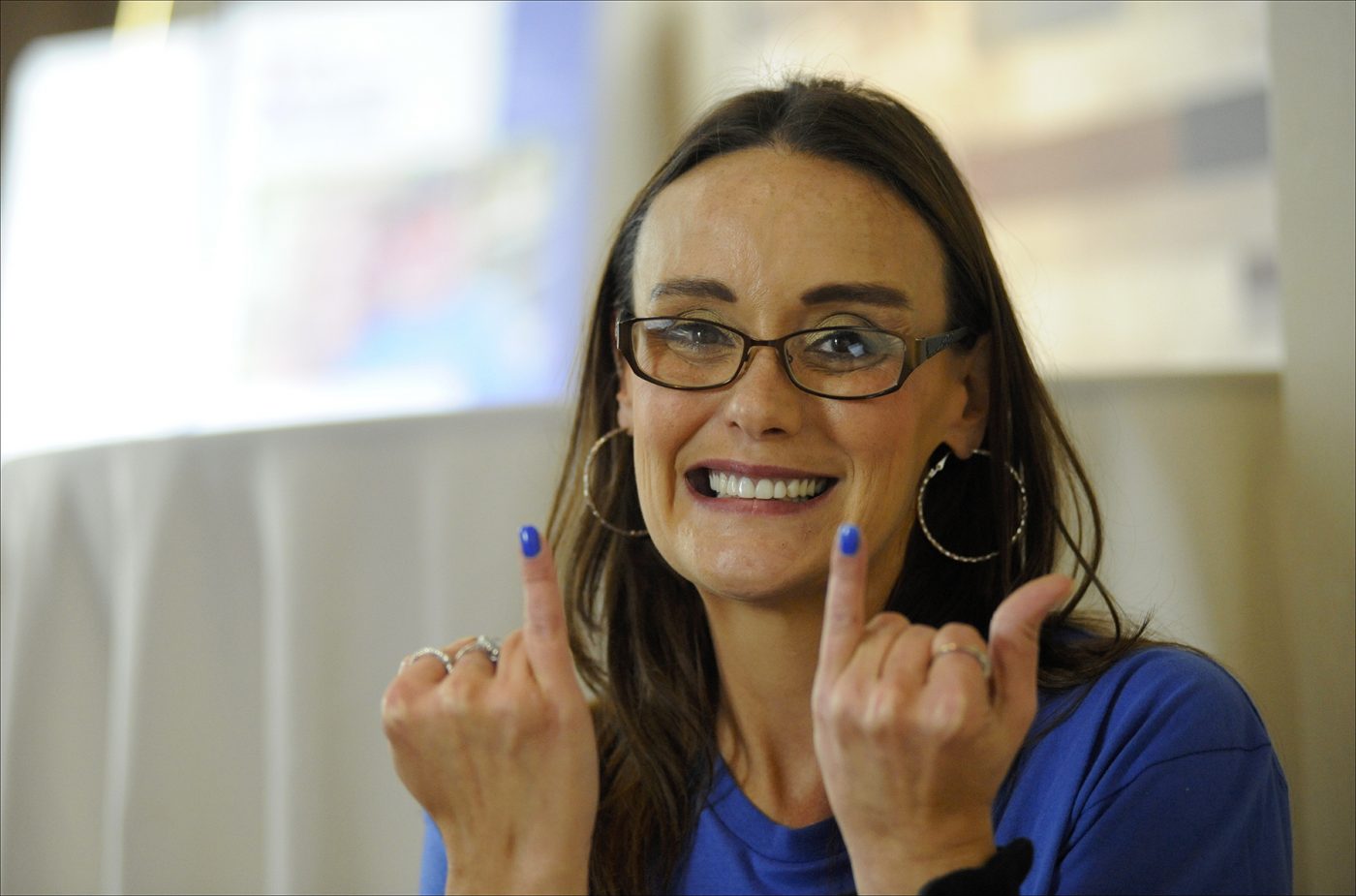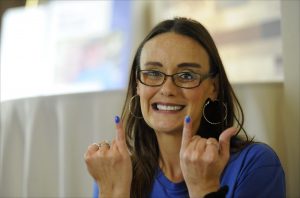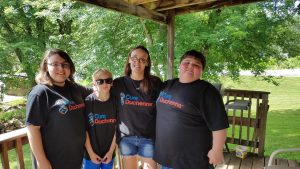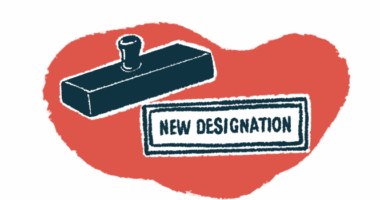West Virginia Mom of Duchenne Boy Struggles to Make Ends Meet

Deborah Swinler Hall proudly holds up her painted pinkies. (Photo by Larry Luxner)
Like many mothers of boys with muscular dystrophy, Deborah Hall hasn’t had an easy life.
Hall, the daughter of a chemical engineer and a stay-at-home mom, was one of six siblings growing up in Boaz, West Virginia. When her younger brother, John, was 3 years old, doctors diagnosed him with Duchenne muscular dystrophy (DMD). Twenty-five years later, he died.
Hall herself was tested at the age of 7 and found to be a carrier. Nevertheless, she and her now-deceased partner had a son, Michael, who was diagnosed with Duchenne in August 2006 — only two months after birth.
“My father had told me there was a chance I could have a child like this,” Hall said. “At the time, Michael was the youngest boy in the country who tested positive. It turned out he had the same deletions of exons — 3 through 21 — that my brother had.”
Two years ago, Hall, 40, was tested again, and learned she was a manifesting carrier. She doesn’t yet have cardiomyopathy, but will eventually develop the condition.
As if that’s not enough, 12-year-old Michael measures 5-foot-2 and already weighs 300 pounds.
“He’s been on prednisone since he was 2 years old, but at age 10 he switched to a weekly dose of Emflaza (deflazacort) because prednisone has a tendency to cause weight gain,” Hall said. She spoke to Muscular Dystrophy News during CureDuchenne’s Futures conference, which took place Nov. 3-4 outside Boston.
Emergency led to boy’s obesity
But Michael’s enormous bulk also stems from a frightening incident six years ago, when a Parkersburg, West Virginia, nurse gave him a flu vaccine in the form of a nasal spray. She did this despite having been warned that the boy was on steroids for his DMD, which can cause serious interactions. As a result, Hall said, he later went into respiratory failure.
Michael was airlifted to Charleston in a helicopter, then had to be transferred to Pittsburgh Children’s Hospital due to heart failure. He spent six weeks in recovery.
“He started getting bigger while laying there in the hospital. All those heart medications and prednisone made him hungry all the time — and with limited mobility, he couldn’t get any exercise,” Hall said. “Michael’s heart is like a 90-year-old man’s heart.”
On the other hand, she said, “he’s a joyful kid. He has nothing but good things to say, and he cares about others. He’s an honor-roll student. His school even did a fundraiser for my family. One of his teachers brought us gifts, and students wrote letters wishing him to get better.”
Hall, a single mom who also has two other children, receives $1,300 a month in supplemental security income and survivor benefits. She also uses food stamps and lives in public housing.
“I don’t have an accessible van for my son where we could put a wheelchair. He’s still mobile but can’t climb steps,” she said. “There is no funding of any sort in West Virginia for people like me. My mom passed away two years ago, and she was the only source of support in my life. That’s why I’m basically all alone.”
Meanwhile, Hall is taking online classes through Colorado Technical University.
“My goal is to do medical transcriptioning because I can do that at home while taking care of my son,” she said. “Another goal is to get my family out of West Virginia, because this state doesn’t have any Duchenne specialists who understand muscular dystrophy.”
Hall added that she set up a GoFundMe account but took it down two years later for lack of support. However, her team — “Michael’s Journey” — is part of CureDuchenne’s “Pinkies Up” campaign to raise money for research in treating, and eventually curing, the disease.
Other groups aid DMD families
Meanwhile, two nonprofit organizations — the Little Hercules Foundation and Team Joseph — are stepping up philanthropic efforts through their joint Duchenne Family Assistance Program.
“Our goal is to help anyone who’s affected by Duchenne,” said Jen Shumsky, personalized access coordination team manager with Little Hercules. “This assistance does not depend on [specific] mutation or income.”
Little Hercules is based in Dublin, Ohio. It was established in 2014 by three moms — two of whom had sons diagnosed with Duchenne — who decided to host events to help fund research. Team Joseph, headquartered in suburban Detroit, was launched by Marissa Penrod after her son, Joseph, received his Duchenne diagnosis in 2008.
Shumsky, a registered nurse who graduated from the University of Michigan, has extensive experience dealing with Medicare issues; she’s the mom of a diabetic child.
“The Little Hercules Foundation and Team Joseph have a strong history of working together,” she said at the Futures conference. “Although we realize that research still needs to be funded, there’s an immediate need to help families. We know the struggles that everyone’s going through.”
Partnership in expansion mode
The partnership, created in October 2017 and expanded this August through the hiring of three full-time experts on insurance and Medicaid issues, focuses on two priorities: financial assistance for Duchenne families, and expertise finding proper treatments and clinical care.
“Team Joseph will work with you on the huge unmet need for equipment not covered by other payers — modifications like vans, ramps to your house, bath lifts, things like that. They also help with travel to clinics. Not all families have the ability to travel to a certain clinic,” Shumsky said. “Our goal is to make sure your child’s care is not limited by your finances. So if you need help with travel, hotel or gas money, Team Joseph will make sure you have that.”
The nonprofit will also help with educational opportunities, allowing families to attend out-of-town training sessions and conferences.
Little Hercules, meanwhile, specializes in helping families navigate insurance coverage, Medicaid, Medicare, or any combination of these things.
“If you’ve been denied access to an approved medication or physical therapy, or dexascans or cardiac MRIs, reach out to us and we can help you work on an appeals process — or we can work with you on an individual basis,” she said. “We’re able to talk to you, find out about your unique situation and do a personalized search in your area for resources, and if needed, make a referral.”
Shumsky explained that there’s still “a lot of confusion” about financial and income limits when it comes to getting help.
“It’s a tough thing to live with Duchenne, and Medicaid waivers vary state by state — sometimes even county by county. Many families aren’t aware that there are Medicaid waivers out there,” she said. “For my son in Michigan, we actually got evaluated for a waiver, he was approved, and through that he got Medicaid. So our family income never played a part in that.”








